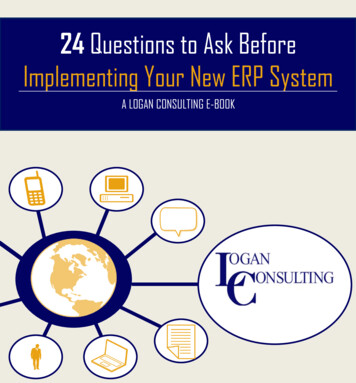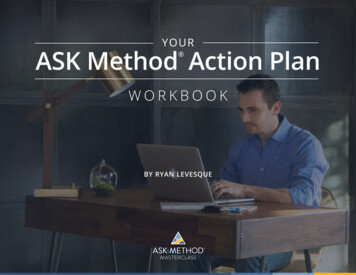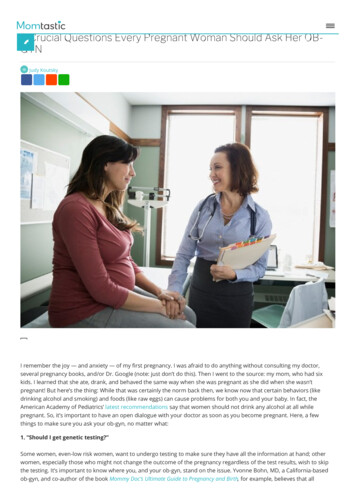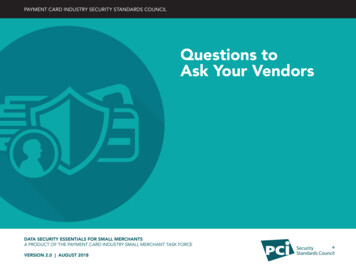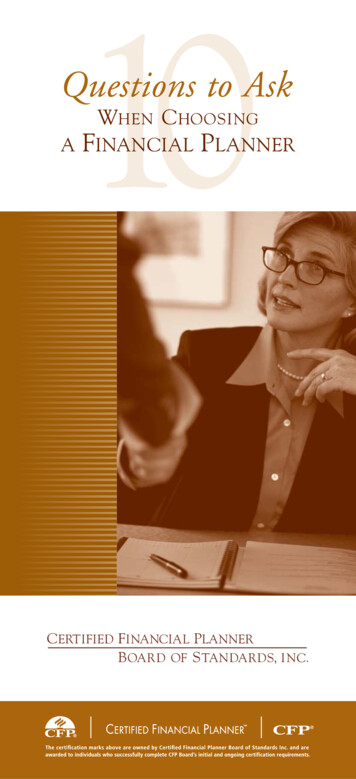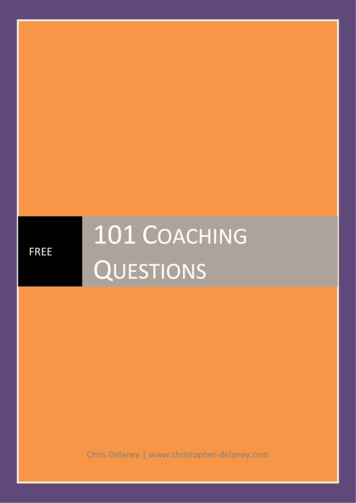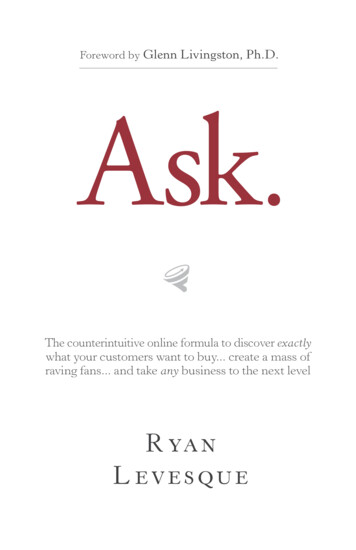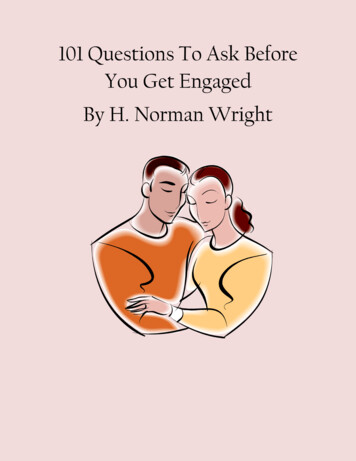
Transcription
101 Questions To Ask BeforeYou Get EngagedBy H. Norman Wright
Chapter OneWarning – Never Marry (or Get Engaged to) a StrangerYears ago there was a very popular love song, “Getting to Know You, Getting toKnow All About You.” Well, that’s probably the best advice to follow if you’re thinking ofengagement.This is not a book about marriage or how to prepare for getting married. It’s morebasic than that. It’s designed to help you answer the question, “Is this the one I want toeven consider as a marriage partner? Is this the person I want to be engaged to as thenext step to marrying them?”During my years of counseling, I’ve heard so many people say, “The person Imarried was not the same one I honeymooned with. It’s as though they changedovernight. What happened?”The answer is simple. They married a stranger. There was either courtshipdeception, or naiveté or not enough questions were asked. Thus, many marriages falter.That’s why this book was written – to give you some of the questions you need answersto now, not later, in order to make a wise decision.Let’s assume you have sufficient money to purchase a new car. You go to the automall where there are 16 dealerships . . . with cars of all makes, models, colors, vintages,and prices. You pull into the lot, park, and stroll over to this “great looking” car. It’s apreviously owned model (which means used). It’s been around the block a few times.But you really like the way it looks and smells, and it’s comfortable inside. There are anumber of gadgets, including a GPS.A salesperson comes up and asks if he can help you. You respond with, “You surecan. I want to buy this car.”“Great. What would you like to know about it?”“Know? What’s there to know? I saw it. I like. I want it – let’s draw up thepaperwork.”“Well, I can do that. Do you have any questions about its warranty, performance,estimated mileage, or the GPS? And since it’s a recent addition, we haven’t even put theprice on it. Don’t you want to know that?”“Not really. All I know is I want it. And you don’t even have to wrap it up for me!”
Would you buy a car in this way? It’s doubtful. It’s almost ridiculous. If you did,you’d be going into it blind. No – of course you’d ask questions. It’s too big of aninvestment, and you don’t want to make a costly mistake.However, many people who make the decision to become engaged do the verysame thing. They don’t ask enough questions. They like what they see and that’s all thatcounts. After all, asking questions isn’t very romantic. . . and you may not like theanswers.The fact is, though, at some time you will discover the answers to your questions.Asking them before you say, “I do,” can help you make your decision, save you someunneeded heartache, or confirm the direction you’re heading. The greater the amount ofinformation you have, the better you’ll be able to make a good decision.I want to help you avoid becoming engaged to a stranger. Yes, it’s painful toexperience the end of a dating relationship. But, it’s even more painful to break off anengagement. Hopefully these questions will help you say, “Yes, I really know this personand feel comfortable in moving ahead,” or “I’m glad I asked these questions now so Idon’t pursue this. It’s time to move on.”Better Now Than LaterOne of the principal questions I’d like you to consider is, “How is youracquaintanceship?” Yes, acquaintanceship. Jeffrey Larson, in his excellent book ShouldWe Stay Together? Described it this way:I define one’s acquaintanceship as a combination of how well you know yourpartner (depth of knowledge) and how long you’ve known your partner (breadth ofexperiences) before marriage. The relationship between acquaintanceship and latermarital satisfaction is simple: The longer and better you know someone before marriage,the greater the likelihood of marital satisfaction. This is because the longer you becomeacquainted with someone before marriage – usually – the better you know them,understand them, and understand your couple strengths and weaknesses.Most of the following questions and thoughts, however, have come from those whodiscovered their answers after they were married. They were shocked, dismayed, andfelt deceived. Many of the questions are direct and blunt. You may thing, “I couldn’t askthat!” You may be hesitant, but why? You may think you’re going to offend your partner,or you may be thinking these seem so unromantic – or you may not want to hear theiranswer (ignorance is not bliss) – or you may be worrying, What if they ask me the samequestions? Well, your partner should ask you the same questions.
You can ask them and discover the answers now, or not ask them and discover theanswers later. It’s your choice. It’s better for you to be in charge of when you find outbecause, as I said earlier, you will.In this introduction, you will find suggestions and guidelines from a number of people.As you read them, they may sound like warnings. They are. There’s no other way to sayit. They are cautionary guidelines. Perhaps that sounds better. These resources aregathered from my many years of relationship counseling.Don’t Ignore The Red FlagsA friend of mine has a particularly powerful statement about his experience with dating.I’ve shared it at many conferences, and people find it incredibly insightful. I’ve askedhim to share a few highlights. I believe the following can be very helpful to anyonedating.In search for the perfect mate, it has taken a long time for me to discover that therereally is no such creature out there. Everything is found in degrees of compromise – CanI live with this or can I accept that, and so on? When I have found one that fits most allof my criteria and parameters, then the question is, Will I fit hers? It’s extremelydifficult trying to find someone where all the gears seem to mesh into place without a lotof grinding.I think one of the things I find invaluable in dating now is all the experience I havecompiled over the years from different situations. I have reached the point now in my40s where I feel I finally know some of the answers to the questions that I didn’t evenknow to ask in my 20s or 30s. But to this day, I am still adding and updating my list ofquestions.If there are any bits of advice I could give anyone who is looking for their ideal mate, it isthese: Ask questions of anyone you date and store their answers in your memory bank tosee if the answers continue to be consistent with their actions. If something appears tobe a red flag, confront it and don’t let it slide as “not that big of a deal.” Interact with theother person’s friends (in group settings), such as on camping trips or skiing trips, orplay interaction group-type games. If possible, spend time with the other person’sparents (and if any red flags come up, don’t ignore them, because their child is a productof their environment). If there are ways of seeing how the other person will handlepressure situations . . . put them in it (this way you are able to see how flexible they areor can be, and how they will hold up under pressure). Build a real relationship but stayout of bed, pray together, have similar values and interest in things, come to know theother person’s faults and know that you can accept them, watch to see how they treattheir pets, and continue to interview them right up to the last moments before marriage.
And as hard as it may seem, if that inner voice tells you that you are making a mistake,at least stop and listen to it. Be willing to pull the plug, or at least put things on holduntil issues can be clarified in the relationship – right up to the day of the wedding. It ismy feeling that I would much rather be very embarrassed and cause hurt to both of usby putting things on hold – or walking away from the relationship right up to the finaldays before the wedding – then suck it up, be mad, and live in misery for the rest of mylife. Why marry when maybe you know deep down inside that things are not right, orthat small things are adding up to be big things but you don’t know how to confrontthem? Why marry just because you’re afraid you might hurt the other person byconfronting her? A lot of this stuff will come to the surface through premaritalcounseling. Know ahead of time that some people are able to mask or hide things. If youdon’t ask specific questions, they may feel, “If you didn’t ask, they didn’t lie.”As I look back in my dating over the years, I have come to realize how really naïve I wasin not even trying to find out what questions I should ask, or in thinking I really didn’thave the right to be asking certain questions until I really didn’t have the right to beasking certain questions until I was deeper into the relationship. There were somequestions that it didn’t even occur to me I should have to ask a “Christian.” I assumedshe would never have been into something that would be blatantly wrong. Never assumeanything!These were words of wisdom that helped many people.If You Have to Talk Yourself into It. . .On another occasion, my friend said,As I reflect back now on six months of dating a very nice woman and think of our firstdate, I realize now I should have followed my instincts and not had a second date. Eventhough she was nice, attractive, and liked to do a number of things I enjoy, I still foundmyself having to talk myself into having another date with her and then another. Wereached a very comfortable place in our dating, but there was something missing, I justcouldn’t put my finger on those missing ingredients until now. They were common senseand a lack of being sensitive to my needs! It took me this long to figure out what I hadsummed up subconsciously on the first date – without realizing it. Maybe part of me isjust slow at coming to these conclusions when the other part of me already knows theoutcome. I wanted to give this person the benefit of the doubt, though . . . And so, sixmonths later I found things no different than in the first couple of hours – except I havenow spent six months of my life I can’t ever recoup.I hoped because we had a lot in common, everything would eventually come togetherwith a happy ending. Sure, some things were good, but being able to look back now andsee the full picture, those few good things were really like settling for crumbs off a plate
when I could and should have been spending for crumbs off a plate when I could andshould have been spending the same amount of time looking elsewhere for the full plate.One time I got some great advice that would have saved me a lot of time and energy inthis case – if you have to talk yourself into buying something, you probably won’t use it.So in carrying this thought into a dating situation, if I have to talk myself into a secondor third date, it probably won’t work either in the long run. I will continue to search forthe one I don’t have to talk myself into a second or third date with. (I know there willalways be the exception to the rule . . . but it is nice to at least have a rule to go by).I am sure I’m not the only one who has found himself trapped in this dilemma, and Ihope these thoughts may save someone else some valuable time in their search for theright person.Real Potential?Sometimes we find ourselves in a slightly different situation than the one my friend wasin. We talk ourselves into an engagement because we see what our partner couldbecome. This won’t work because it’s a relationship with low potential. Your partner isnot what you want him to be or what you had hoped for, yet you find yourself thinking,But he has such great potential!Consider the following such relationship: Perhaps he’s not what you’re looking for spiritually. But you think, The Lordcould really do wonders with him. Perhaps his ambition and drive to get ahead is a bit lacking. (That’s anunderstatement.) But he’s just waiting for the right opportunity to come along. Perhaps your partner has emotional outbursts a bit too often for you. But I’ll beable to help him get a handle on that anger and depression eventually. It doesn’tmatter that his friends tell you the mood swings have always been there and aregetting more intense as the years go by. (Look out!) Perhaps the way your partner eyes the opposite sex doesn’t seem to reflect thedepth of your relationship. But once we’re committed, he’ll only have eyes for meand no one else. (Are you serious?) Perhaps the way he handles his finances is a bit scary, especially with all thosecredit cards maxed out. But you think, I’m sure he’ll learn responsibility oncewe’re married. In fact, didn’t he offer to open a join checking account and creditwith you so the two of you could learn to more closely work together financially?(That will be a real learning experience for you – like the Road to Bankruptcy 101!Do you really expect marriage to create a miracle?) Perhaps he doesn’t communicate very much or share with you on an emotionallevel. But you rationalize, Who would, coming out of that abusive, alcoholic,dysfunctional background? You’ve met his parents and they’re both cases out of
a mental-health textbook. In time, you expect to fill in all those gaps for yourpartner and he’ll become a whole person. (Of course, there may be nothing left ofyou, either.) Perhaps the reason he has jumped from relationship to relationship is that noone has ever really cared for him enough, been truly accepting of him, orencouraged him to grow spiritually. Getting him involved in my church and Biblestudy should make a difference.If you believe in all of these possibilities, then the problem is not the other person. Youknow who it is . . . you!First of all, you can’t reshape, remake, and reconstruct another person to this degree.You can’t get gold out of a mine that’s filled with lead. I’ve seen people in marriages likethis. They end up frustrated, and critical, feeling betrayed and hopelessly trapped. Theyplead, beg, shout, and threaten their partner, but to no avail.Why would anyone fool themselve
engagement. Hopefully these questions will help you say, “Yes, I really know this person and feel comfortable in moving ahead,” or “I’m glad I asked these questions now so I don’t pursue this. It’s time to move on.” Better Now Than Later One of the principal questions I’d like you to consider is, “How is your acquaintanceship?” Yes, acquaintanceship. Jeffrey Larson, in his excellent book Should
